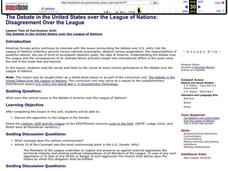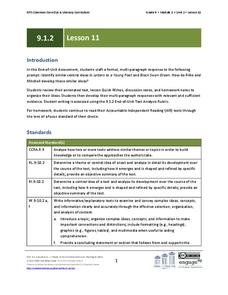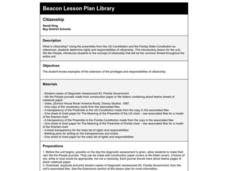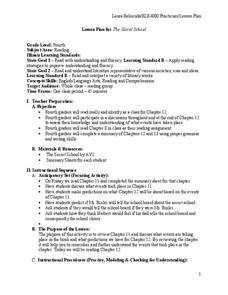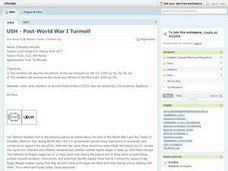PBS
Latino Americans Share Their Experiences
Three Latino Americans are the focus of an interactive that spotlights their accomplishments. Scholars get to know Lin-Manuel Miranda, Judy Reyes, and José Hernández through short informative text and videos. Participants read, take...
Curated OER
Orienteering - Lesson 1 - Maps & Map Scales
Lesson 1 of 10 lessons in this orienteering unit is about maps and map scales. After all, orienteering is all about maps, compasses, and finding ones' way around. It is imperative to be able to read maps and understand the relevance of...
Curated OER
Using Aphorisms to Help Dealing with People
Here's a formal plan for what many effective teachers already do: Provide a week's worth of aphorisms and have learners choose one to write about in their journals each day. They reflect on the meaning of each aphorism and project how it...
Curated OER
Synthesis of Information
Locating and synthesizing information is an essential part of the research process but can be overwhelming for many young writers. Eliminate some of the stress and confusion, this resource suggests, by separating these steps. To focus...
Curated OER
Tarantula Girl
In this reading comprehension worksheet, students read a two page true story about a girl who loves tarantulas. Students complete a 12 question multiple choice quiz on the story. There are four additional reading comprehension stories...
Curated OER
Where in the World is Flat Stanley?
Second graders analyze the proper form of a friendly letter and send flat Stanley letters all over the United States. In this letter writing lesson, 2nd graders read the book Flat Stanley by Jeff Brown and create their own Flat...
Curated OER
Reading Comprehension Activity
In this reading comprehension worksheet, young scholars read 3 different stories, then complete multiple choice questions about each.
Curated OER
Using Primary Sources: Letters from the Presidents
Students find out about the minds and thoughts of presidents through reading their actual letters. They explore the personal lives of presidents. They answer questions about a primary source. They write essays.
Curated OER
African Americans in the Civil War
Eleventh graders examine the role of African-Americans in the Civil War. After reading a poem, they analyze and identify the difficulties faced by African Americans. In pairs, they complete a worksheet based on the poem and information.
Curated OER
The Vietnam War: Causes and US Involvement
Students are introduced to the origins of the Vietnam War, including causes and US involvement. They are given a reading handout over the Vietnam war with questions to answer. Students are shown picture of important people, maps, and...
EngageNY
Mid-Unit Assessment: Completing My Draft Position Paper
What's the difference? Scholars analyze the similarities and differences between introductory and concluding paragraphs. Then, using a model essay as a guide, they write their draft position papers.
Ohio Department of Education
Observe Then Infer
To develop their skill at drawing inferences from observations, sixth graders rotate through six stations, conduct a series of experiments, make observations, and draw inference from what they observe.
Curated OER
The Debate in the United States over the League of Nations: Disagreement Over the League
Learners examine the opposition of the US Senate to Woodrow Wilson's idea of a League of Nations. They discuss the central ideas involved in the debate over the League.
EngageNY
Grade 9 ELA Module 1, Unit 2, Lesson 11
As an end-of-unit assessment, class members craft a formal, multi-paragraph essay identifying a similar idea found in Rainer Maria Rilke's collection, Letters to a Young Poet, and David Mitchell's Black Swan Green. Writers state and use...
Curated OER
President's Day
First graders imagine that they are the President of the United States. In this history lesson the students think of three rules or laws that they would create if they were President. The students listen to a book about George Washington...
Curated OER
Traveling with Flat Stanley
pupils use the internet to gather geographical data about a state of their choice. Using new vocabulary, they describe the features present in the state, its climate and attractions. They develop a PowerPoint presentation to share...
Curated OER
The U.S. Constitution
Young scholars explain the differences between the three branches of government. Using the structure of a democracy, they listen to text about the United States Constitution. They discover how their government affects their lives in...
Curated OER
Citizenship
Fifth graders read the preamble of the U.S. and Florida Constitutions. They discuss vocabulary definitions surrounding the concept of citizenship. They discuss and write about the rights and responsibilities of citizens and apply their...
Curated OER
Sweet Potato Pie Goes Fast
Students practice their reading fluency by covering up parts of words in order to identify word they do not know, and by completing repeated readings. They read "Sweet Potato Pie" with a reading partner who times them and records the...
Curated OER
The Secret School
Fourth graders read THe Secret School. In this language arts lesson, 4th graders make predictions prior to reading and discussing the story. Students write a summary of the chapter.
Curated OER
Wood
Students practice reading comprehension strategies. In this literacy and science lesson, students read a non-fiction article about wood and locate main ideas and details. Students construct a card game using information taken from the text.
Curated OER
Cultural Lit. 31: The U.S. and Iroquois Constitutions
Students identify and compare major elements of Iroquois and United States Constitutions.
Curated OER
Government
High schoolers evaluate how the United States government has maintained a balance between protecting rights and maintaining order. They analyze the impact of Supreme Court decisions on governmental powers and the rights and...
Curated OER
1th Grade U.S. History from 1877
Eleventh graders engage in a lesson that is about the study of history in the United States after the end of World War I. They conduct research using a variety of resources and then summaries are written to explain the reasons for The...












